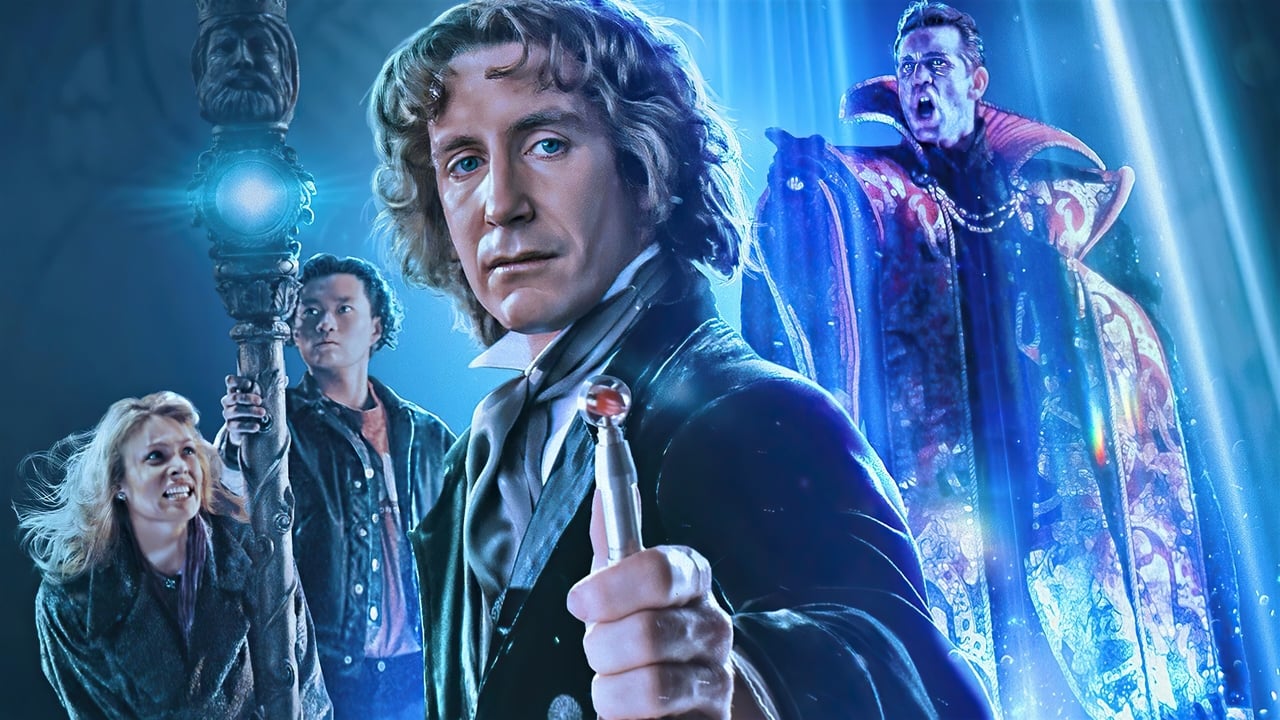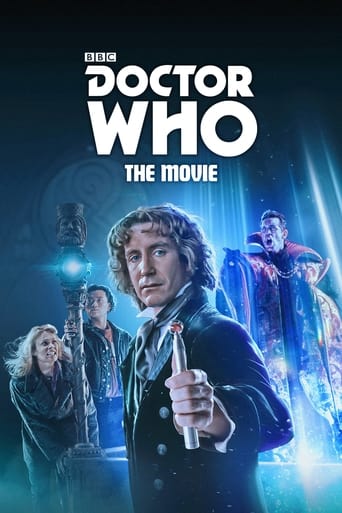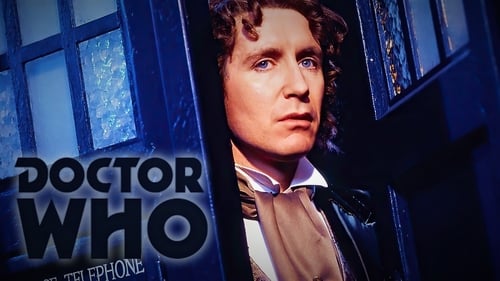



Overrated and overhyped
One of the worst movies I've ever seen
From my favorite movies..
The thing I enjoyed most about the film is the fact that it doesn't shy away from being a super-sized-cliche;
View MoreThe only thing good about this movie was Paul McGann... I can almost see him as the doctor. He has the charm to be the doctor, but other than that, bad. I mean, the Doctor was shot, then he was romantically involved with his companion who for a real doctor wasn't that good, he as a doctor was complete fool almost whole movie... Disaster! The doctor, the "real" doctor has that charisma around him that made you believe in him, he is brilliant, always 10 steps ahead over everybody else even when he's regenerating. Doctor is not just good looking, the way he does things is what makes him so great. He doesn't like guns. And most of all he is not half-human. Very bad try.
View MoreFirst of all: I am a mega Who fan, and would never want to diminish the awesomeness that is Doctor Who, but; these are still my opinions: While I have watched the movie twice purely out of loving Doctor Who (and trying to grasp the personality of the eighth incarnation), I do not LOVE this movie. First of all, America should have never tried to revive a purely British Sci-Fi show in the first place. (I'm American myself, and even I think this was a bad idea!) They literally urinated all over the character of both The Doctor, and the Master. Okay, to make this review simpler, I will do pros/cons.Pros (or "good things" about the movie):Paul McGann. Paul McGann wonderfully portrayed a sexy, suave Doctor. He was gorgeous, and brilliant. The Master. Once he stole a human body (*eye rolling*), he was pretty Master-y. Even stopping to dress up when so he could look the part to steal the Doctor's body or lives or whatever.The companions. Grace Holloway and Chang Lee were fun characters. A surgeon and a street thug were pretty good ideas to pair up with our favorite Time Lord.Cons (or "bad things" about the movie):Half-Human: The eighth incarnation is apparently half human? First of all, they never fully explain that crap. (It might not have been a terrible idea if they would have.) It was unnecessary, and not well done.Snot-Snake ghost crap: So the Master has all his lives taken away (haha cool punishment!), but yet is magically able to become a snot looking snaking ghost and break out of his little grave and possess someone, LITERALLY. This was never explained, since he wasn't shown to be able to that before! (Also, he has quite a bit stronger psychic abilities than I have ever seen a Time Lord have.The Eye of Harmony: New TARDIS part, I think. But nevertheless, I wished they would have just used the heart of the TARDIS as the plot device that The Master opened instead of adding that. It didn't make a ton of sense in the story and fell pretty flat with me. (Even Steven Moffat had negative comments about this and The Master snake of snot ability thing!)Seven-to-Eight: Seven's regeneration was kind of cool, but, shooting the Doctor to kill him off? Well shooting which caused a surgery and what not, but still.. That kind of craps on one of the most entertaining staples of the show! (The Doctor's ability to make whimsical speeches to get out of trouble.) Overall, not the best way to regenerate The Doctor:/Anyhow, those are my opinions. Sorry if I offended any Whovians! I still like the movie, but I just don't quite LOVE it. Also, I post Doctor Who on Instagram! Follow me if you would like: my user is: November23rd1963.
View MoreAmidst the various specials surrounding the 50th anniversary of Doctor Who was a short mini-episode called The Night of the Doctor. It served as a prequel to the main event, whetting the appetite of fans by showing the regeneration of the Eighth Doctor into John Hurt's "War Doctor". Previously, this incarnation appeared only in an American produced TV movie broadcast in 1996, bridging the gap between the original series and the 2005 revival.In this film, the Eighth Doctor is played by Paul McGann, best known for starring as the eponymous "I" (or Marwood) in Withnail & I (1987) alongside Richard E. Grant. Grant himself would later go on to play a version of the Tenth Doctor in Comic Relief's Doctor Who and the Curse of Fatal Death (1999) and the villainous Dr. Simeon (a facet of the Great Intelligence) opposite Matt Smith's Doctor in 2012.McGann makes a very good Doctor, combining the typical eccentricity of the role with budding elements of the childlike joie de vivre that would come to typify later incarnations. The Fourth Doctor's jelly babies even make an appearance. He saves this picture from being an otherwise failed attempt to reinvent Doctor Who for an American audience. Entertainingly, this Doctor enjoys dropping hints about the futures of people he meets, although whether this knowledge comes from his travels or merely his abilities as a Time Lord is unclear.The USA has a long history of remaking and adapting British films and TV shows, whilst tragically underestimating their own audiences. Although a direct continuation of the original series, this film was such an attempt to give The Doctor his big American outing.This is not to say that Doctor Who has no appeal for America. Stateside support has thrived since the 2005 revival, and now makes up an integral part of the series' fan base. Moreover, this highlights how unwise and unnecessary such transatlantic pandering is when it merely diminishes the quintessentially British characteristics that make Doctor Who unique.Though the film was American produced, director Geoffrey Sax is British. With a background in BBC drama, he appears an appropriate choice to helm the picture. However, the direction is largely pedestrian, with an over reliance on Dutch angles, and action sequences which could be part of any other low key '90s movie.Perhaps this film is a product of the decade more than it is a product of Americanisation. To his credit Sax utilises the opulent TARDIS set to its full advantage during sequences of dialogue. Sax would go on to direct the mainstream, though tepidly received White Noise (2005) and Stormbreaker (2006).On the other side of the fence, it is refreshing to see a man with access to the whole of time and space make a stop in somewhere that isn't contemporary London. Here, the Seventh Doctor (Sylvester McCoy) lands in San Francisco on 31st December 1999, prophetically amid the dying embers of an old millennium. A failure to successfully navigate the gangs and guns of Chinatown swiftly lands The Doctor in hospital, and sparks his next regeneration.The film rejects Daleks or rubber aliens in favour of a more human faced story, pitting The Doctor against long term foe and rival The Master (Eric Roberts, who would later appear as the mysterious Thompson in Heroes). The two spend much of the film stalking the city in search of each other, and predictably, the New Year provides an ultimatum: The Master opens the TARDIS' energy source, which will destroy the Earth by midnight unless the Doctor can reset it with an atomic clock.The saga of a time travelling Englishman on the trail of his slippery nemesis recalls the plot of Time After Time (1979) in which H. G. Wells (Malcolm McDowell) arrives in modern day San Francisco in pursuit of Jack the Ripper. Indeed, the Doctor is shown reading Wells' The Time Machine at the start of the film and the aesthetic of the TARDIS design and Eighth Doctor's wardrobe is reminiscent of similar late 19th Century science fiction. The Master meanwhile goes Terminator, issuing stoic demands whilst clad in leather jacket and shades,The Doctor finds a companion in fellow physician Grace Holloway (Daphne Ashbrook), whose childhood dreams of keeping death at bay inspired her to become a doctor. When she learns about regeneration, her world view is challenged, as she was the surgeon whose failure caused the Seventh Doctor's demise.Symbolically, the film dwells on the obvious themes of time and rebirth and the ability of time travel to hold back death. This is something which the Doctor is more reluctant to do in other media, and the film takes the opportunity to stray away from established mythology in other ways, including the revelation that the alien Doctor is half-human. The plot is driven by the temporary amnesia The Doctor suffers after regenerating, and he swiftly develops a romantic relationship with Grace.While it is far from the greatest Doctor Who story in existence, it's a shame that Doctor Who: The Movie did not spark a new series starring Paul McGann. Watching thirty odd years of any TV series is a mammoth task so for those who have seen but a handful of 'classic' episodes, the movie provides nothing if not a way to complete an entire Doctor's tenure in one fell swoop.
View MoreThe TV Movie: the one attempt to relaunch the series between the original series ending in 1989 and the new series beginning in 2005. So long remembered as Paul McGann's one TV appearance as the Doctor or as that time the Americans ruined Doctor Who, the TV Movie was written off for a long time. It also faded into obscurity for many US fans due to the rights issues between the BBC and Universal kept it from receiving first a VHS and then later a DVD release. With the DVD finally out and with the TV Movie's profile rising again, perhaps we can finally see it for being more then the single televised adventure of the eighth Doctor but also the comeback that should have been.Perhaps the biggest highlight of the movie is that contains Paul McGann's debut as the eighth Doctor. Some of the actors who've played the Doctor have found their feet after some time, others almost immediately and it would seem that McGann is one of the latter. From the moment he appears walking out of a morgue in a shroud to the last scene in the TARDIS, McGann embodies everything the Doctor should be: eccentric, intelligent, melancholic at times yet be an all around watchable and likable character. The American setting in fact highlights the eccentric qualities of McGann's performance even more. Perhaps the greatest shame of the TV movie is that this would be McGann's sole Doctor Who TV appearance.There's also a good supporting cast backing him up. Playing the companion is Daphne Ashbrook as Dr. Grace Holloway who goes from a simple operation into an adventure with the fate of the world at stake. It helps that McGann shares some fine chemistry with her and the movie shines whenever they're together. Ashbrook also makes Grace's back and forth swapping about whether or not to believe the Doctor work despite the fact that it makes very little sense. There's also Yee Jee Tso as Chang Lee who does a adequate job due in what seems due in large part to the script rather than his skills as an actor. Not forgetting of course Sylvester McCoy's all too short appearance as the seventh Doctor in the opening minutes either though his appearance seems rather unnecessary and potentially over complicates the film for anyone seeing Doctor Who for the first time (something that this TV Movie was supposed to be for).Which rather brings us to Eric Roberts as the Master. I mus confess that I am in two minds about Roberts' performance. There are times when he is actually quite sinister such as the scene when he initially meets Chang Lee in the TARDIS. Yet for the most part, Roberts is over the top at every possible occasion such as the "I always dress for the occasion!" line for example. The Roberts Master then is sinister yet over the top but whether that helps or hurts the film is left up to the individual viewer to decide.The production values could easily rival anything that the new series has yet produced. Of particular mention is the music of composer John Debney's score, the first time that Doctor Who had gotten the feel of having a full orchestral score including the excellent version of the Doctor Who Theme used in the opening and closing credits. The design of the TARDIS interior with its Gothic/Jules Verne, almost steam punk, feel is also of note. There is also the superb direction of Geoffrey Sax throughout the entire movie which does its best to ride the fine line between the Britishness of the series and the American setting, something in which it sometimes succeeds and sometimes doesn't.Which leads to the script. For something that was meant to be the launch of an American co-produced Doctor Who TV series yet is is seemingly continuity heavy. Within the first few minutes for example the viewer has the Master, the Daleks, regeneration, the TARDIS and two different Doctors being thrown at them. The movie itself works well with its mix of humor and a good vs evil storyline as the plot heads towards the Millennium (remember this was shown in 1996) until the ending. While there's plenty of plot holes along the way (such as the aforementioned business with Grace shifting back and forth about believing the Doctor), for the most part though the story holds up despite those faults.Where does all of that leave the TV Movie then? It features a fine debut for the eighth Doctor, good performances and has some fine production values. While it has its faults, the fact that this was more or less a pilot does excuse some of the faults present. Looking back on the TV Movie nearly twenty years after it was made one thing is clear: it was the comeback that should have been.
View More